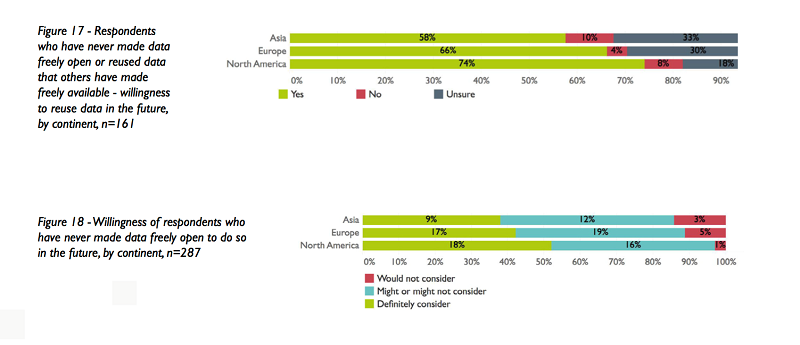Four Pillars of Open Science: Open Data
- Details
- Published on 29 September 2017

This is the third blog post from our new series exploring Open Science, focussing on each foundational pillar in turn. This week our post focuses on open data.
What is open data?
“Open data are online, free of cost, accessible data that can be used, reused, and distributed provided that the data source is attributed."- FOSTER
‘Open data’ is a hot topic in the scholarly publishing community; as with all areas of the Open Science movement, there are many debates to be had and many differing opinions. For open data, these debates centre on the advantages and disadvantages of making all data freely available for reuse. There is agreement, however, that if open data is to be increasingly mandated by funders and adopted as common practice globally, there need to be significant improvements in the processes and systems that support discoverability and reusability of these datasets.
According to SHERPA/JULIET there are currently 45 funders globally who mandate some form of open data archiving and 19 who encourage it, 45% of whom are based in the UK.
Useful resources
Open Knowledge International is a not-for-profit organization focused on realizing open data’s value to society by helping people to access and use data to take action on social problems. They produce and curate resources, and make them available in their Data Handbook ,giving guidance, and providing stories and case studies for both government and wider society.
In the news
In October 2016 Digital Science published a report: The State of Open Data The State of Open Data, that: explores potential applications of open data in accelerating critical scientific research; considers case studies from across the world; and presents compelling insights gleaned from a survey of over 2,000 researchers regarding open data. Approximately 75% of all respondents had made research data open at some point, with 57% having reused data made freely accessible by others. Of those respondents that hadn’t either made data available or reused data by others at the time of the survey, a clear majority showed an inclination to do so in the future, as shown in the chart below.

Open data is not an initiative that is relevant only to the academic research community. The Open Data Institute recently released an invitation to tender for service providers to redesign the ways in which public services use, share, and release data. 17 national and 34 subnational governments have signed up to the International Open Data Charter , which sets out the following principles for government data:
- Open by Default
- Timely and Comprehensive
- Accessible and Usable
- Comparable and Interoperable
- For Improved Governance and Citizen Engagement
- For Inclusive Development and Innovation
4open's policy on open data
4open authors are invited to upload supplemental datasets related to their research to an online repository, making it available for both human and machine reading in order to further aid the acceleration of scientific discovery.
Authors are invited to prepare and deposit their data according to the FAIR data principles. FAIR stands for Findable, Accessible, Interoperable and Re-usable:
TO BE FINDABLE:
F1. (meta)data are assigned a globally unique and eternally persistent identifier.
F2. data are described with rich metadata.
F3. (meta)data are registered or indexed in a searchable resource.
F4. metadata specify the data identifier.
TO BE ACCESSIBLE:
A1 (meta)data are retrievable by their identifier using a standardized communications protocol.
A1.1 the protocol is open, free, and universally implementable.
A1.2 the protocol allows for an authentication and authorization procedure, where necessary.
A2 metadata are accessible, even when the data are no longer available.
TO BE INTEROPERABLE:
I1. (meta)data use a formal, accessible, shared, and broadly applicable language for knowledge representation. I2. (meta)data use vocabularies that follow FAIR principles. I3. (meta)data include qualified references to other (meta)data.
TO BE RE-USABLE:
R1. meta(data) have a plurality of accurate and relevant attributes.
R1.1. (meta)data are released with a clear and accessible data usage license.
R1.2. (meta)data are associated with their provenance.
R1.3. (meta)data meet domain-relevant community standards.
Full information about the FAIR data principles can be found on the FORCE11 website.
Read more about 4open's policies on the instructions for authors page.
Upcoming Events
Open Access Week will be held on October 23rd-29th and this year the theme is “Open in order to:"which “recognizes the diverse contexts and communities within which the shift to Open Access is occurring and encourages specific discussion that will be most effective locally“. Open data will be a key topic for discussion on this theme so make sure to follow the conversation on Twitter at #OAWeek #OpenInOrderTo
There is also a full calendar of events available at: http://www.openaccessweek.org/events
Did you miss the first post in this series, where we signposted useful resources on the topic of Open Access, or the second post, where we looked at varying definitions of “Transparency"and “Openness"in Peer Review?.
Next in the series, we will discuss Open Code.
Keep up-to-date with 4open news and blogs by following 4open on Twitter: @4openjournal

